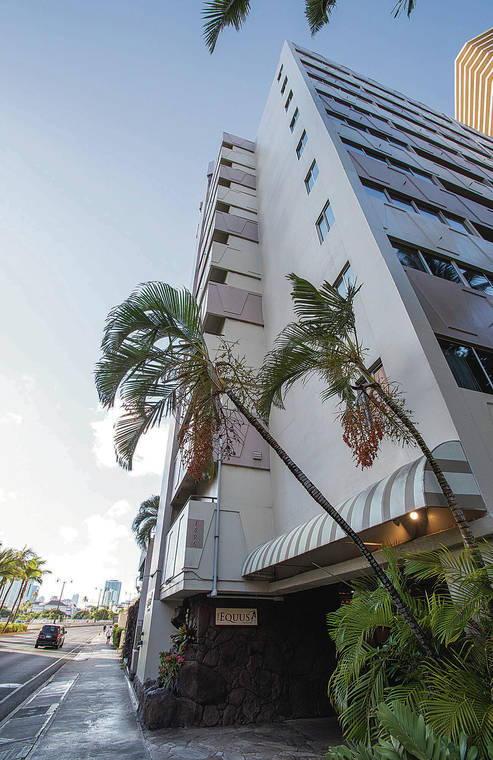2 more Oahu hotels expected to house COVID-19 patients

CINDY ELLEN RUSSELL / CRUSSELL@STARADVERTISER.COM
The Equus was identified on Wednesday to be one of the Waikiki hotels allocating rooms for quarantine and isolation purposes.
State Health officials are working with the city to use two more Oahu hotels to isolate and quarantine potentially hundreds more homeless people and others with mental health issues who may have contracted COVID-19.
There are currently 293 units — representing multiple beds — on Oahu that can isolate and quarantine homeless people and those with mental health issues, Eddie Mersereau, deputy director of the state Health Department’s behavioral health administration, told members of the House Committee on Human Services &Homelessness on Friday.
As of Friday, Mersereau said that 83 units were occupied, but the need is expected to grow as cases surge across Oahu, including among newly released inmates from Oahu Community Correctional Center who have been linked to a cluster of COVID-19 cases at the Institute for Human Services in Iwilei, Hawaii’s largest homeless shelter.
Mersereau was asked specifically how many beds are available for use by homeless people and those with mental health issues who are incapable of finding proper places to isolate or quarantine for 14 days.
But he suggested that some of the rooms and beds also could be used by members of large Pacific Islander families who live in one-room apartments and cannot easily socially distance or isolate.
Some 130 rooms were made available by the city this week, Mersereau said, and 250 more are expected “in the coming days in partnership with the City and County” for a total of 550 rooms.
Don't miss out on what's happening!
Stay in touch with breaking news, as it happens, conveniently in your email inbox. It's FREE!
“That may not necessarily be enough, but that’s a good start for us,” Mersereau said.
But Mayor Kirk Caldwell on Friday said the number of rooms could be as high as 700, although it was unclear how many would be used specifically for people who are homeless or have mental health issues.
Caldwell appeared on the Honolulu Star-Advertiser’s Spotlight Hawaii Facebook livestream and said he is negotiating to have two more Oahu hotels used for people who need to quarantine or isolate.
The city is already using one Waikiki hotel to quarantine and isolate people who have tested positive for COVID-19, have been in close contact with someone who has tested positive or otherwise need help to quarantine or isolate.
“We worked with the Department of Health to have it managed for COVID positives or those who have come in close contact, and we’re working at retaining two more hotels,” Caldwell said. “We’d like to see maybe up to 700 hotel rooms ready to go as we do the surge testing and people need to be isolated, particularly multi-generational households, … provide a place for them to be isolated and cared for.”
Mersereau suggested that 700 rooms would not be used solely for Pacific Islanders living in cramped quarters, the homeless and those with mental health issues.
If 10% of people undergoing free tests on Oahu test positive, Mersereau said that would mean 7,000 people would be in need of isolation and quarantine. (The office of U.S. Surgeon General Jerome Adams has clarified that the number of surge tests expected to be self administered across Oahu over the next several days is 60,000, not 70,000, saying Adams misspoke).
But Mersereau’s point was that Oahu could be overwhelmed by “700 folks in Honolulu that we would need to support and quarantine in isolation.”
All but one of Hawaii’s 70 known cases of COVID-19 among Hawaii’s homeless population have occurred on Oahu, Scott Morishige, the state’s homeless coordinator, told the House Committee on Human Services &Homelessness.
The only other case was previously reported on Maui when a patient left a homeless encampment for medical treatment and contracted COVID-19 at a Maui hospital that was experiencing an outbreak.
Of the 69 known Oahu cases, 52 were linked to a cluster at IHS, Morishige said.
Some inmates released from OCCC also appear linked to 23 cases at facilities that provide other homeless-related services, said Dr. Amy Curtis, division chief of the Health Department’s adult mental health division.
“What we’ve seen so far is that there does seem to be some inter- connectiveness between outbreaks we’re seeing at OCCC and in outbreaks that we’re seeing at homeless shelters, as well as some of our providers, our treatment providers, the substance abuse, other behavioral health needs … (due to) the mixing of these different populations.”
At the same time, Morishige, told the House committee that social service outreach workers continue to find success in getting homeless people off of the street.
Just since June, Morishige said, 470 people leaving homeless programs on Oahu — or 51% — found permanent housing; along with another 245 across the neighbor islands, for a neighbor island rate of 71%.
“I think that’s phenomenal,” Morishige said.



